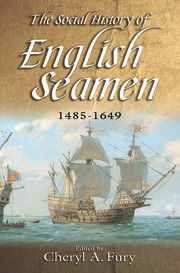Book contents
- Frontmatter
- Contents
- Illustrations
- Contributors
- List of Abbreviations
- Introduction
- 1 The English Maritime Community, 1500–1650
- 2 The Work of G.V. Scammell
- 3 The Men of the Mary Rose
- 4 Tudor Merchant Seafarers in the Early Guinea Trade
- 5 The Elizabethan Maritime Community
- 6 The Religious Shipboard Culture of Sixteenth and Seventeenth-Century English Sailors
- 7 Health and Health Care at Sea
- 8 The Relief of English Disabled Ex-Sailors, c. 1590–1680
- 9 Seamen's Wives and Widows
- 10 Jacobean Piracy: English Maritime Depredation in Transition, 1603–1625
- Conclusion
- Bibliography
- Index
6 - The Religious Shipboard Culture of Sixteenth and Seventeenth-Century English Sailors
Published online by Cambridge University Press: 05 September 2013
- Frontmatter
- Contents
- Illustrations
- Contributors
- List of Abbreviations
- Introduction
- 1 The English Maritime Community, 1500–1650
- 2 The Work of G.V. Scammell
- 3 The Men of the Mary Rose
- 4 Tudor Merchant Seafarers in the Early Guinea Trade
- 5 The Elizabethan Maritime Community
- 6 The Religious Shipboard Culture of Sixteenth and Seventeenth-Century English Sailors
- 7 Health and Health Care at Sea
- 8 The Relief of English Disabled Ex-Sailors, c. 1590–1680
- 9 Seamen's Wives and Widows
- 10 Jacobean Piracy: English Maritime Depredation in Transition, 1603–1625
- Conclusion
- Bibliography
- Index
Summary
In the mid-1590s when Sir Henry Percy, the ninth Earl of Northumberland, decided to pass on several decades of his wisdom and experience, he suggested, as did many aristocrats, that his eldest son consider a career in the military. In regards to soldiers, he remarked that they ‘are of two sorts, either landsmen, or seamen (as they call them), and their persuasions will be built upon one of these two bases, Honour or Wealth’. On first inspection, Northumberland's advice seems rather unremarkable. Obviously, he was referring to the two main branches of the military. However, on closer inspection, his wording is rather curious. He does not say that there are ‘soldiers’ and ‘seamen’ but landsmen and seamen. This dichotomy has profound implications for our ability to understand the religious inclinations of early modern English seamen.
As Northumberland implied, early modern commentators and later, some modern historians have determined that sailors were a particularly distinct cultural group, with experiences that had little in common with English people living on land. The origins of this notion are complex, but at base they stem from the perception that the sea contrasts radically with the land. Wild and untamed, the sea has always represented the terrible power of nature dispensing almost casually its unique brand of wonder, death and destruction. To work at sea automatically put a man into a somewhat rarefied group. According to one proverb popular during the early seventeenth century, ‘He who unto the sea commits his bodie, is either poore, or desp'rat, or a noddie.’
- Type
- Chapter
- Information
- The Social History of English Seamen, 1485-1649 , pp. 141 - 192Publisher: Boydell & BrewerPrint publication year: 2012



